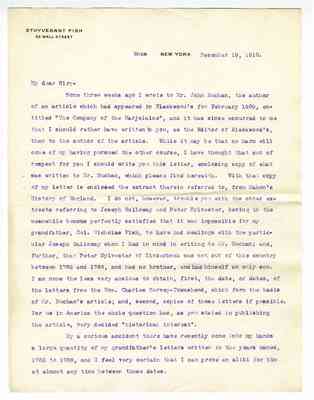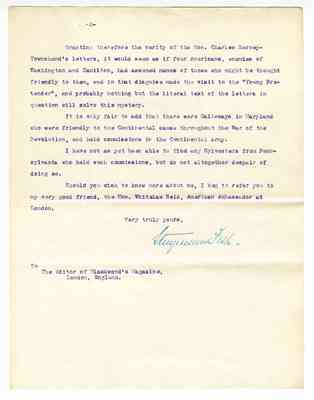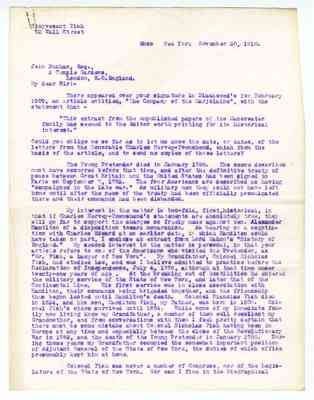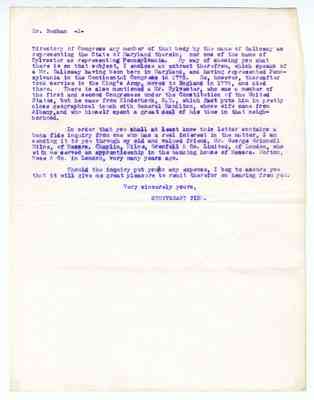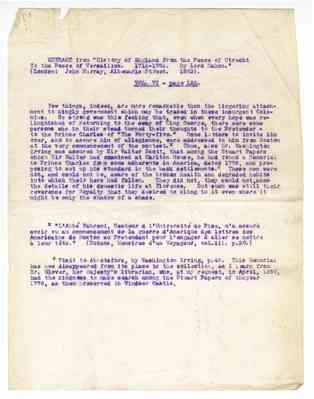Pages
page_0006
Stuyvesant Fish 52 Wall Street Encs; New York; December 19, 1910.
My dear Sir:-
Some three weeks ago I wrote to Mr. John Buchan, the author of an article which had appeared in Blackwood's for February 1909 entitled "The Company of the Marjolaine", and it has since occured to me that I should rather have written to you, as the Editor of Blackwood's, than to the author of the article. While it may be that no harm will come of my having pursued the other course, I have thought that out of respect for you I should write this letter, enclosing copy of what was written to Mr.Buchan, which please find herewith. With that copy of my letter is enclosed the extract therein referred to, from Mahon's History of England. I do not, however, trouble you with the other extracts referring to Joseph Galloway and Peter Sylvester, having in the meanwhile become perfectly satisfied that it was impossible for my grandfather, Col. Nicholas Fish, to have had dealings with the particular Joseph Galloway whom I had in mind in writing to Mr. Buchan; and, further, that Peter Sylvester of Kinderhook was not out of this country between 1783 and 1788, and had no brother, and had himself an only son. I am none the less very anxious to obtain, first, the date, or dates, of the letters from the Hon. Charles Hervey-Townshend, which form the basis of Mr. Buchan's article; and, second, copies of those letters if possible. For us in America the whole question has, as you stated in publishing the article, very decided "historical interest".
By a curious accident there have recently come into my hands a large quantity of my grandfather's letters written in the years named, 1783 to 1788, and I feel very certain that I can prove an alibi for him at almost any time between those dates.
page_0007
-2-
Granting therefore the variety of the Hon. Charles HerveyTownshend's letters, it should seem if four Americans, enemies of Washington and Hamilton, had assumed names of those who might be thought friendly to them, and in that disguise made the visit to the "young Pretender", and probably nothing but the literal text of the letters in question will solve this mystery.
It is only fair to add that there were Galloways in Maryland who were friendly to the Continental cause through the War of the Revolution, and held commissions in the Continental army.
I have not as yet been able to find any Sylvesters from Pennsylvania who held such commissions, but do not altogether despair of doing so.
Should you wish to know more about me, I beg to refer you to my very good friend, the Hon. Whitelaw Reid, American Ambassador at London.
Very truly yours, Stuyvesant Fish
To The Editor of Blackwood's Magazine, London, England.
page_0008
Stuyvestant Fish 52 Wall Street
Encs New York November 30, 1910.
John Buchan, Esq., 3 Temple Gardens, London, E.C. England.
My dear Sir:-
There appeared over your signature in Blackwood's for February 1909, an article entitled, "The Company of the Marjorlaine", with the statement that -
"This extract from the unpublished papers of the Manorwater family has seemed to the Editor worth printing for its historical interest."
Could you oblige me so far as to let me know the date, or even dates, of the letters from the Honorable Charles Hervey-Towshend, which form the basis of the article, and to send me copies of those letters?
The Young Pretender died in January 1788. The scene described must have occured before that time, and after the definitive treaty of peace between Great Britain and the United States had been signed in Paris on September 7, 1783. The four Americans are described as having "campaigned in the late war." As military men the could not have left home until after the news of the treaty had been officially promulgated there and their commands had been disbanded.
My interest in the matter is two-fold, first, historical, in that if Charles Hervey-Townshend's statements are absolutely true, they will go far to support the charges so freely made against Gen. Alexander Hamilton of a disposition toward monarchism. As bearing on a negotiation with Charles Edward at an earlier date, in which Hamilton could have taken no part, I enclose an extract from Lord Mahon's "History of England." My second interest in the matter is personal, in that your article refers to one of the Americans who visited the Pretender, as "Mr. Fish, a lawyer of New York". My Grandfather, Colonel Nicholas Fish, had studied Law, and was I believe admitted to practice before the Declaration of Independence, July 4, 1776, although at that time under twenty-one years of age. At the breaking out of hostilities he entered the military service of the State of New York, and later that of the Continental Line. His first service was in close association with Hamilton, their commands being brigaded together, and the friendship thus begun lasted until Hamiton's death. Colonel Nicholas Fish died in 1834, and his son, Hamilton Fish, my Father, was born in 1808. Colonel Fish's widow survived until 1854. While none of my immediate family now living knew my Grandfather, a number of them well recollect my Grandmother, and from conversations wtih them I feel pretty certain that there must be some mistake about Colonel Nicholas Fish having been in Europe at any time and especially between the close of the Revolutionary War in 1783, and the death of the Young Pretender in January 1788. During those years my Grandfather occupied the somewhat important position of Adjutant General of the State of New York, the duties of which office presumably kept him at home.
Colonel Fish was never a member of Congress, nor of the Legislature of the State of New York. Nor can I find in the Biographical
page_0009
Mr. Buchan -2-
Directory of Congress any member of that body by the name of Galloway as representing the State of Maryland therein; nor one of the name of Sylvester as representing Pennsylvania. By way of showing you what there is on that subject, I enclose the extract therefrom, which speaks of a Mr. Galloway having been born in Maryland, and having represented Pennsylvania in the Continental Congress in 1775. He, however, thereafter took service in the King's Army, moved to England in 1778, and died there. There is also mentioned a Mr. Sylvester, who was a member of the first and second Congresses under the Constitution of the United States, but he came from Kinderhook, N.Y., which fact puts him in pretty close geographical touch with General Hamilton, whose wife came from Albany, and who himself spent a great deal of his time in that neighborhood.
In order that you shall at least know this letter contains a bona fide inquiry from one who has a real interest in the matter, I am sending it to you through my old and valued friend, Mr. George Grinnell Milne, of Messrs. Chaplin, Milne, Grenfell & Co. Limited, of London, who with me served an apprenticeship in the banking house of Messrs. Morton, Rose & Co. in London, very many years ago.
Should the inquiry put you to any expense, I beg to assure you that it will give me great pleasure to remit therefor on hearing from you.
Very sincerely yours, STUYVESTANT FISH.
page_0010
EXTRACT from "History of England From the Peace of Utrecht To the Peace of Versailles. 1713-1783. By Lord Mahon." (London: Joh Murray, Albermarle Street. 1853).
VOL. VI - page 122.
Few things, indeed, are more remarkable than the lingering attachment to kingly government which may be traced in these insurgent Colonies. So strong was this feeling that, even when every hope was relinquished of returning to the sway of King George, there were some persons who in their stead turned their thoughts to the Pretenderto the Prince Charles of "The Forty-five." Some letters to invite him over, and to assure him of allegiance, were addressed to him from Boston at the very commencement of the contest. x Thus, also Mr. Washington Irving was assured by Sir Walter Scott, that among the Stuart Papers which Sir Walter had examined at Carlton House, he had found a Memorial to Prince Charles from some adherents in America, dated 1778, and proposing to set up his standard in the back settlements. * These men were not, and could not be, aware of the broken health and degraded habits into which their hero had fallen. They did not, they could not, know the details of his domestic life at Florence. But such was still their reverence for Royalty that they desired to cling to it even where it might only be the shadow of a shade.
x "l'Abbe Fabroni, Recteur d l'Universite de Pise, m'a assure avoir vu au commencement de la guerre d'Amerique des lettres des Americains de Boston au Pretendant pour l'engager a aller se mettre a leur tete." (Dutens, Memoires d'un Voyageur, vol iii. p.30.)
*Visit to Abbotsford, by Washington Irving, p. 48. This Memorial has now disppeared from its place in the collection, as I learn from Mr. Glover, her Majesty's librarian, who, at my request, in April, 1850, had the kindness to make search among the Stuart Papers of the year 1778, as then preserved in Windsor Castle.
